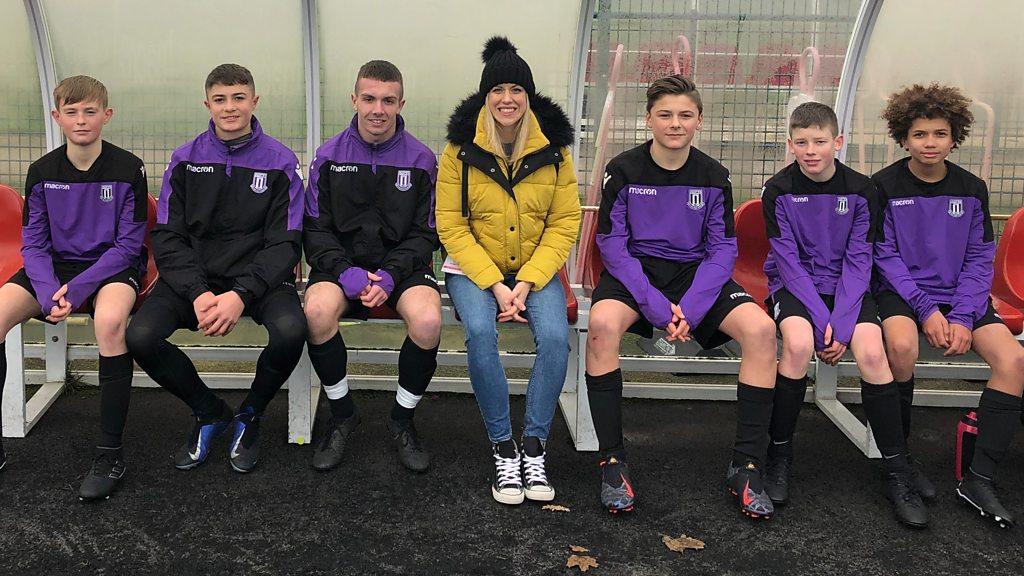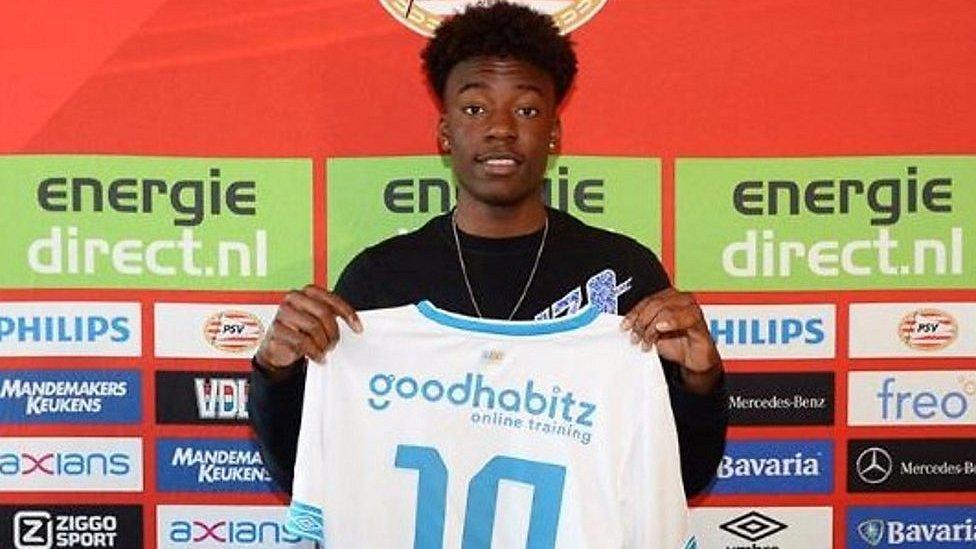Premier League: Why are young UK football players moving abroad?
- Published
- comments
Premier League: Why are young UK football players moving abroad?
Jadon Sancho, Jonathan Panzo, Reiss Nelson - just some of the young players from British Premier League clubs who in the last year have gone to clubs in Europe to find their route into professional football.
And its proving to be pretty successful too - Jadon Sancho, who moved from Manchester City to Borussia Dortmund in 2018, has not only been one of the stand-out performers of the German Bundesliga but he's also been called up for the England team three times since October 2018.
Why are talented young British football players choosing to go to clubs abroad and what does it mean for the sport?
WATCH: How does the Academy system work?
How does the Premier League Academy system work?
Players can be scouted for a youth team from the age of six and if successful, later on in their teens, their club will either offer them a full-time professional contract or release them.
Playing for an Academy takes up most of your time, so you've got to be dedicated and you've got to want to be a footballer.
In the past, most players who'd signed a contract would then get experience either out on loan at a lower level club or train and play in the reserves.
Some players won't sign the contract and will leave for another club - that could be abroad or in the UK - if they think they're more likely to get first team football elsewhere.
What do young Academy players think?
WATCH: Stoke City Academy players
I went to visit Stoke City Academy to find out what some of the Premier League's younger players there think about first team football.
"It's definitely harder to get into the first teams now," one said.
Academy players' opportunities to go through to the first team... it's tough.
"Sometimes I do worry," another Stoke City Academy player added.
Most claimed they would consider moving to a club in Europe in the future.
One young player said: "You've got more chance of becoming and having that dream of being a professional footballer."
What's it like to move from the UK to play in another league in Europe?
In June 2018, Noni Madueke signed for PSV Eindhoven in the Netherlands from Tottenham having rejected a professional contract with Manchester United. He was 16 at the time.
Noni made his debut in the Uefa Youth League for Spurs and has starred for England at various youth levels.
WATCH: PSV Eindhoven's Noni Madueke moved from Tottenham in 2018
Noni thinks it was the "best choice" for him and he's happy that it's happening more:
He said: "There's less distractions when you move to another country.
"And there's lots of top players being put into the first team at such a young age in Europe."
I felt like playing away from the Premier League was best for my development.
Moving to a strange country at such a young age can be difficult and throw up lots of different challenges such as missing friends and family, learning a new language and culture and eating different types of food.
But Noni believes it's a fantastic experience for players of his age.
"It was tough at the start when you miss friends and family," he said.
"But some of my favourite restaurants from England are still here ... my new team-mates are good, and we have similar interests. It's not that different culturally.
"It's the best thing for any young player because it means that when you get to 20, 21 you're not being loaned out, you've already had experience at the top level."
I just feel like it makes you more valuable.
It is 20 years since a Premier League side last fielded an all-English team, and the growth of talented players from around the world has meant fewer chances for home-grown players.
When asked if the Premier League might be losing some of its best young talent, Noni said: "Yeah, 100 per cent. If there's the offer of first team football that's not being offered in England ... the best players, a lot of them will keep going to different countries."
Why are young UK football players going abroad?
Former Liverpool and England international Danny Murphy has witnessed the growth of the Premier League as both a player and an analyst for BBC's Match of the Day.
And he doesn't blame talented young British players for looking for opportunities abroad.
WATCH: Match of the Day analyst, Danny Murphy, told me what he thinks it means for the sport
He said: "At the moment we've got an abundance of good, young English talent being stifled because of the quality of the Premier League and the amount of foreign players in the squads at the top clubs.
"If you love playing football and you're sat on the bench watching it, you get frustrated.
"Why not take on a different culture and play football somewhere else.
"It can help young players in terms of development of their football, playing more regularly, living in a new culture and learning a new language."
'Premier League clubs have to learn a lesson'
I hope that some of the bigger Premier League teams now look at this and think 'we need to be more pro-active in giving our younger players an opportunity in the first team.'
Murphy, who played nine times for England, added: "Supporters love to watch young English talent come through into the first team.
"I think the Premier League clubs have to learn a lesson from it as well and make sure the best young talent doesn't all start leaving us, because we want to see them."
We asked the Premier League for a statement, but they said they wouldn't give us a comment on this.
- Published4 March 2019

- Published4 March 2019

- Published4 March 2019

